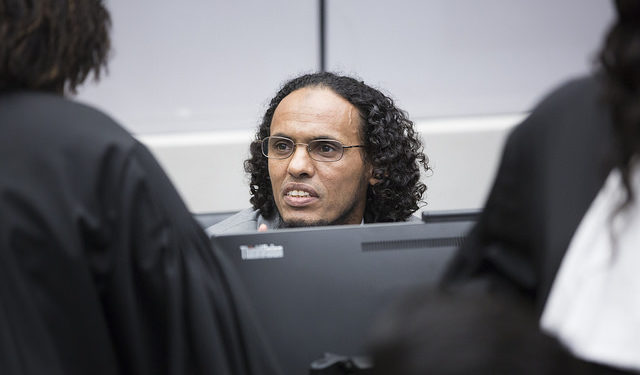Al Qaeda-linked man gets nine years in ICC jail for Timbuktu attack
Judges at the International Criminal Court have sentenced an Al Qaeda linked enforcer to nine years in jail for destroying religious and cultural monuments in Timbuktu.
The year Ahmadi Al Faqi Al Mahdi has already spent in detention at The Hague since his arrest on September 15, 2015, will be deducted from his sentence.
Judges Raul C. Pangalangan (Presiding), Antoine Kesia-Mbe Mindua and Judge Bertram Schmitt, who constituted Trial Chamber VIII, said that, even if inherently grave, crimes against property are generally of less gravity than crimes against persons. The targeted buildings – consisting of mausoleums of saints and mosques of Timbuktu — were an integral part of the religious life of its inhabitants and constitute a common heritage for the community. The United Nations Educational Cultural Scientific and Cultural Organisation had designated all the sites, but one, as World Heritage sites.
The judges said Al Mahdi’s admission of guilt, and his show of remorse, as well as his detailed account of his acts helped to mitigate his sentence. They noted that Al Mahdi had cooperated with the Prosecution despite potential security implications for his family in Mali, and took responsibility for his actions as early as the first day of his interviews with the Prosecution, which enabled the parties to reach an agreement sufficiently early in the proceedings.
Al Mahdi’s call on people not to become involved in similar conduct and his offer to reimburse the cost of a door at the Sidi Yahia Mosque together with his initial reluctance to commit the crime and the steps he took to limit the damage caused by advising against the use of bulldozers in the attack influenced the judges in giving him a lighter sentence.
Al Mahdi was the head of the Hesbah, one of four primary institutions established by Ansar Dine and Al Qaeda in the Islamic Maghreb upon occupying Timbuktu. He had overall responsibility for the execution of the attack, supervising operations, using the Hesbah’s members and determining the sequence in which the buildings would be destroyed, making the necessary logistical arrangements and justifying the attack to the broader world through media interviews. He also was present at all of the attack sites, giving instructions and moral support, and personally participated in the attack that led to the destruction of at least five sites.
The attacks occurred within the context of the upheaval in Mali in January 2012, during which different armed groups took control of the north of the country. In early April 2012, following the retreat of Malian armed forces, the groups Ansar Dine and Al-Qaeda in the Islamic Maghreb (AQIM) took control of Timbuktu. From then until January 2013, Ansar Dine and AQIM imposed their religious and political edicts on the territory of Timbuktu and its people. They did so through a local government, which included an Islamic tribunal, an Islamic police force, a media commission and a morality brigade called the Hesbah.
Al Mahdi was viewed as an expert on matters of religion, and was consulted in this capacity, including by the Islamic tribunal. He was very active in aspects of the Ansar Dine and AQIM administration. He led the Hesbah from its creation in April 2012 until September 2012 and wrote a document on its role and objectives.
In late June 2012, the leader of Ansar Dine – Iyad Ag Ghaly – decided to destroy the mausoleums, in consultation with two prominent AQIM members – Abdallah Al Chinguetti and Yahia Abou Al Hamman. Al Mahdi was also consulted by the governor of Timbuktu, Abou Zeid, before this decision was made and expressed his opinion that all Islamic jurists agree on the prohibition of any construction over a tomb, but recommended not destroying the mausoleums so as to maintain relations between the population and the occupying groups. Nevertheless, Ag Ghaly gave the instruction to proceed to Abou Zeid, who in turn transmitted it to Al Mahdi in his capacity as the chief of the Hesbah. Despite his initial reservations, Al Mahdi agreed to conduct the attack without hesitation on receipt of the instruction. Al Mahdi wrote a sermon dedicated to the destruction of the mausoleums, which was read at the Friday prayer at the launch of the attack. He personally determined the sequence in which the buildings were to be attacked.
The ICC Pre-Trial Chamber I issued a warrant of arrest against Al Mahdi on September 18, 2015. He was surrendered to the court on September 26, 2015.
On March 24, 2016, Pre-Trial Chamber I confirmed against Ahmad Al Faqi Al Mahdi the war crime charge concerning attacks against historic and religious monuments in Timbuktu, Mali, and committed him to trial.







